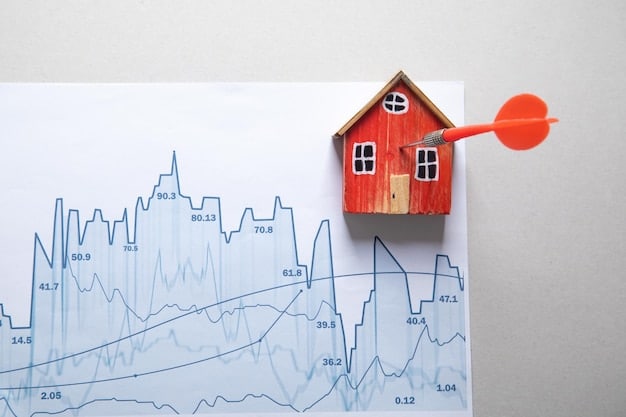Housing Market Slowdown: Impact on Industries & Business Growth

The housing market slowdown is significantly impacting related industries such as construction, real estate, mortgage lending, and home improvement, while also affecting overall business growth due to decreased consumer spending and investment.
The American dream of owning a home is facing headwinds as the housing market slowdown: how it’s affecting related industries and business growth becomes increasingly apparent. This shift is not just about fewer homes being sold; it’s a ripple effect impacting various sectors of the economy. Let’s delve into the specifics.
Understanding the Current Housing Market Slowdown
The housing market slowdown refers to a decrease in the pace of home sales, construction, and price appreciation. Several factors contribute to this cooling trend, affecting both buyers and sellers.
Key Indicators of a Slowdown
One of the primary indicators is the increase in housing inventory. As demand cools, homes stay on the market longer, leading to a rise in available properties. This shift gives buyers more negotiating power but can also signal trouble.
Another crucial indicator is the decline in mortgage applications. As interest rates rise, fewer people are willing to take out loans to purchase homes, further dampening demand. These indicators collectively paint a picture of a market in transition.
- Rising interest rates impact affordability.
- Increased inventory provides more options but slows sales.
- Declining mortgage applications signal decreased buyer interest.
In conclusion, the current housing market slowdown is characterized by increased inventory, rising interest rates, and declining mortgage applications, creating a challenging environment for both buyers and sellers.

Impact on the Construction Industry
The construction industry is directly and immediately affected by a housing market slowdown. With fewer homes being sold, demand for new construction diminishes, leading to a series of challenges.
Reduced Construction Starts
A decrease in housing demand translates directly into fewer new construction projects. Builders become more cautious, scaling back their plans to avoid being stuck with unsold inventory. This reduction in construction starts has a cascading effect on related industries.
The ripple effect extends to suppliers of materials and equipment. Demand for lumber, cement, and other construction materials declines, impacting manufacturers and distributors. This downturn can lead to layoffs and business closures.
- Decreased demand for new homes reduces the number of construction projects.
- Suppliers of construction materials face lower sales volumes.
- Job losses in the construction sector become more common.
In summary, the construction industry faces significant challenges during a housing market slowdown, with reduced construction starts and decreased demand for materials leading to job losses and economic strain.
Real Estate and Brokerage Challenges
Real estate agents and brokerage firms are on the front lines of the housing market, and they feel the slowdown acutely. Their income is directly tied to the volume of home sales, and a decrease in transactions hits their bottom line.
Lower Commission Revenues
With fewer homes being sold, real estate agents earn fewer commissions. This decline in revenue can make it difficult for agents to cover their expenses, and some may be forced to leave the industry. The competition for fewer clients intensifies.
Brokerage firms also face challenges. They must adapt their business models to the new reality, focusing on cost-cutting measures and finding new ways to generate revenue. Some firms may consolidate or close down altogether.
- Real estate agents experience a decrease in commission income.
- Brokerage firms struggle with reduced transaction volumes.
- The industry sees increased competition and potential consolidation.
In conclusion, the real estate and brokerage sector faces significant challenges during a housing market slowdown, with lower commission revenues and increased competition forcing firms to adapt and agents to struggle.

Mortgage Lending Industry Pressures
The mortgage lending industry is another sector heavily affected by a housing market slowdown. As demand for homes decreases, so does the demand for mortgages, leading to increased pressures on lenders.
Decline in Mortgage Originations
A drop in home sales translates directly into fewer mortgage originations. Lenders find themselves with less business, and they must compete fiercely for the remaining borrowers. This competition can lead to lower profit margins.
Mortgage lenders may also face increased defaults as homeowners struggle to make payments in a slowing economy. This rise in defaults can lead to financial losses for lenders and increased scrutiny from regulators.
- Reduced demand for mortgages leads to fewer originations.
- Lenders face increased competition and lower profit margins.
- The risk of mortgage defaults rises, impacting lenders’ financial stability.
In summary, the mortgage lending industry confronts significant pressures during a housing market slowdown, with a decline in mortgage originations and increased risk of defaults creating financial challenges.
Home Improvement and Retail Impacts
The home improvement and retail sectors also feel the effects of a housing market slowdown. When people are less confident about the value of their homes, they are less likely to invest in renovations and upgrades.
Reduced Spending on Home Upgrades
As home sales slow, homeowners become less inclined to spend money on major renovations or improvements. They may postpone projects or opt for cheaper alternatives, affecting sales for retailers and contractors.
Retailers selling home-related products, such as furniture and appliances, also see a decline in sales. New homeowners typically make these purchases, and with fewer homes being sold, demand decreases across the board.
- Homeowners reduce spending on renovations and upgrades.
- Retailers selling home-related products experience lower sales.
- Contractors specializing in home improvements face reduced demand.
In conclusion, the home improvement and retail sectors are impacted by a housing market slowdown, with reduced spending on upgrades and lower sales of home-related products creating challenges for businesses.
Broader Business Growth Implications
The effects of a housing market slowdown extend beyond the directly related industries, influencing broader business growth and overall economic activity. The ripple effect can be felt in various sectors.
Decreased Consumer Spending
A slowdown in the housing market can lead to decreased consumer confidence, which in turn affects spending. When people feel less wealthy due to declining home values, they may cut back on discretionary purchases.
The impact on local economies can be significant. Businesses that rely on consumer spending, such as restaurants and retail stores, may see a decline in sales, leading to layoffs and reduced investment.
- Lower consumer confidence leads to decreased spending.
- Local businesses face reduced sales and potential layoffs.
- Overall economic activity slows down.
In summary, the housing market slowdown has broader implications for business growth, with decreased consumer spending and reduced economic activity creating challenges for various sectors.
Strategies for Businesses to Adapt
Businesses need to adapt to survive and thrive during a housing market slowdown. Several strategies can help navigate these challenging times.
Diversification and Cost Management
One approach is to diversify revenue streams. Construction companies, for example, could explore commercial projects or government contracts to offset the decline in residential construction. Cost management is also crucial, focusing on efficiency and reducing unnecessary expenses.
Another strategy is to focus on niche markets. Real estate agents could specialize in certain types of properties or target specific demographic groups. This specialization can help them stand out in a competitive market.
- Diversify revenue streams to reduce reliance on the housing market.
- Implement cost-management strategies to improve efficiency.
- Focus on niche markets to differentiate from competitors.
In conclusion, businesses can adapt to a housing market slowdown by diversifying, managing costs, and focusing on niche markets to navigate challenging economic conditions.
| Key Point | Brief Description |
|---|---|
| 📉 Slowdown Impact | Affects construction, real estate, and mortgage sectors. |
| 🔨 Construction Cuts | Fewer new building projects and reduced material demand. |
| 🏡 Real Estate Woes | Lower commissions and tougher competition for agents. |
| 💰 Lending Crunch | Fewer mortgages and higher default risks for lenders. |
Frequently Asked Questions
▼
Rising interest rates, increased housing inventory, and economic uncertainty are primary drivers. These factors reduce affordability and demand, leading to a slowdown.
▼
Homeowners may see a decrease in property values and longer selling times. This can affect their ability to relocate or refinance their mortgages at favorable rates.
▼
Construction, real estate, mortgage lending, and home improvement industries are particularly vulnerable. These sectors rely heavily on housing market activity for their revenue.
▼
Yes, buyers may find more negotiating power and lower prices due to increased inventory. Also, investors might see opportunities to acquire properties at discounted rates.
▼
Diversification of revenue streams, cost management, and focusing on niche markets are effective strategies. Businesses should adapt to changing market conditions to remain competitive.
Conclusion
Navigating the housing market slowdown: how it’s affecting related industries and business growth requires careful planning and adaptation. By understanding the key challenges and implementing proactive strategies, businesses can mitigate the negative impacts and position themselves for future success. Keeping informed and remaining flexible will be essential in these dynamic times.





